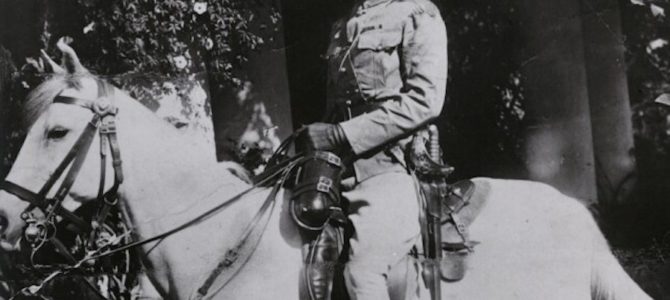In the second lecture of Hillsdale College’s free online Winston Churchill and Statesmanship course (which you can take along with me here), Larry Arnn explains why understanding Churchill’s experiences as a young officer in the British army is crucial to understanding how he led the Allies to victory during WWII.
Churchill’s reputation as a courageous young man earned him the respect he needed to get elected to parliament. On his writings on the Battle of Omdurman, Churchill spoke out against the poor treatment of women in the Dervish societies. He advocated for a liberal society and the equal treatment of all men regardless of their sex or other genetic markers.
Throughout his experience on the battlefield, Churchill was troubled by the changing landscape of warfare. Technological advancements diminished the importance of courage. No matter how courageous an opponent was, they didn’t stand a chance if the other side had higher grade weapons.
During the Boer War, Churchill escaped capture by the Boers in 1900, which vaulted him to the status of a war hero in the public consciousness. Afterwards he was elected as a member of parliament. Despite his reputation as a military man, he was opposed to excessive government spending on the military or other endeavor. He believed that in a liberal society, men ought to be able to keep as much of their hard-earned cash in their pockets. In a speech delivered on the floor of the House of Commons in 1901, he chided fellow members of parliament for how the spoke of war — reacting with horror that they spoke of it as if it were a game.
We must not regard war with a modern Power as a kind of game in which we may take a hand, and with good luck and good management may play adroitly for an evening and come safe home with our winnings. It is not that, and I rejoice that it cannot be that. A European war cannot be anything but a cruel, heartrending struggle, which, if we are ever to enjoy the bitter fruits of victory, must demand, perhaps for several years, the whole manhood of the nation, the entire suspension of peaceful industries, and the concentrating to one end of every vital energy in the community. I have frequently been astonished since I have been in this House to hear with what composure and how glibly Members, and even Ministers, talk of a European war. I will not expatiate on the horrors of war, but there has been a great change which the House should not omit to notice . . . a European war can only end in the ruin of the vanquished and the scarcely less fatal commercial dislocation and exhaustion of the conquerors. Democracy is more vindictive than Cabinets. The wars of peoples will be more terrible than those of kings.
Though he was courageous in the face of danger on many occasions, Churchill was afraid of war. He was fearful that modern societies would destroy themselves and everything that mattered to the people within its boundaries.
Churchill believed that “modern societies contained the seeds of their own destruction,” Arnn said.
This wariness of modern society — advancing technology, an increasingly calloused people, and the destruction of social institutions — would remain a theme throughout Churchill’s life. And it’s this skepticism that made Churchill an invaluable asset throughout both of the World Wars to come.









